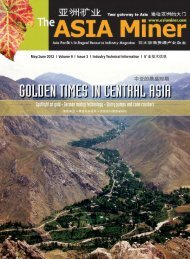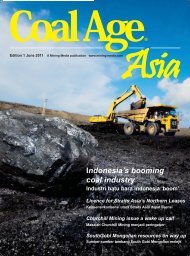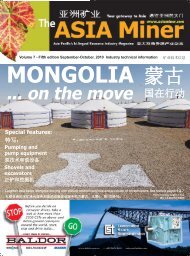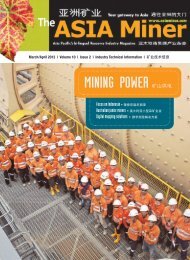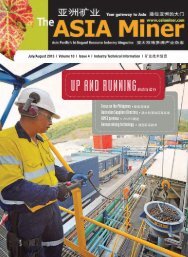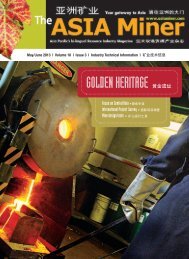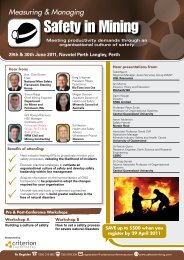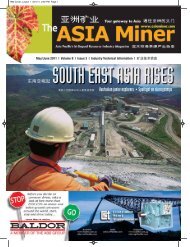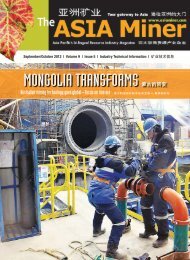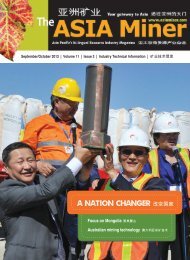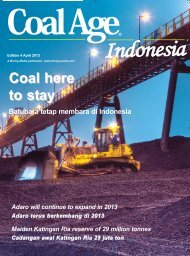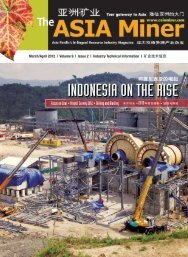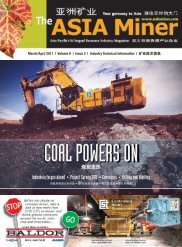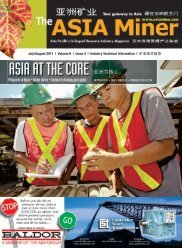MINING WELCOME 欢迎采矿 - The ASIA Miner
MINING WELCOME 欢迎采矿 - The ASIA Miner
MINING WELCOME 欢迎采矿 - The ASIA Miner
Create successful ePaper yourself
Turn your PDF publications into a flip-book with our unique Google optimized e-Paper software.
Education Training<br />
Money Mining Intelligence By Lanita Idrus, publisher, <strong>The</strong> <strong>ASIA</strong> <strong>Miner</strong><br />
DESPITE the impending rubber-stamping of the<br />
mining tax by the Senate after approval by the<br />
Lower House, the mining industry in Australia is<br />
truly alive and well if not thriving. It will also continue<br />
to survive and traverse the mining tax and<br />
carbon tax issues for some time to come.<br />
Australia, and the world’s mining industry,<br />
can thank Australian individuals, organizations<br />
and institutions for the innovative investments<br />
they have made to the industry.<br />
Australian’s innate inclination for ‘global roaming’<br />
has facilitated this transfer of knowledge<br />
worldwide and is feeding improvements in<br />
the education of the workforce for the mining<br />
industry globally.<br />
Such innovative investments and innovations<br />
generally arise out of experiences and experiences<br />
that shape the way we think. What we<br />
think enables us to design the future we want.<br />
Underpinning all this is our education – how we<br />
learn, whom or what we learn from and how<br />
we understand our experiences.<br />
It is through education that we shape our<br />
future leaders and it is no different in our mining<br />
industry. Leaders in this industry must<br />
continue to forge the path ahead in order to<br />
resolve the skills shortage issue.<br />
Education in mining has been under-estimated,<br />
under-valued and under-funded but<br />
not until it is more widely realized and understood<br />
that we are fast becoming ‘resourceless’<br />
in providing manpower to the industry<br />
will it become a hot topic again.<br />
<strong>The</strong> three prime reasons for people to look at<br />
education as a solution source are (i) improving<br />
ROIs, (ii) the need for manpower; and (iii) specific<br />
technical challenges within the industry.<br />
For whatever reason that applies to you or<br />
your company - it is never too late to invest in<br />
education for the overall good of oneself but<br />
more importantly for the mining industry.<br />
Take Money Mining for example. Now a<br />
course run by Whittle Consulting, it is the epitome<br />
of more than 25 years of research and<br />
dedication to the mining industry resulting in a<br />
rigorous plan of action to revise and revitalize<br />
the way we think about what we do, how we<br />
do it and how wisely we dissipate our company’s<br />
funds. Though having a fundamental<br />
basis in mathematical algorithms, you need not<br />
be a mathematical genius to do the course. All<br />
you need is an open mind and your experiences.<br />
Whittle Consulting director Gerald Whittle,<br />
who is also mentor/leader of this course,<br />
will do the rest with you. How can one course<br />
improve the ROI of a company by more than<br />
5%, and the Net Present Value by 5%-35% or<br />
more Well Money Mining can… case studies<br />
upon case studies have proven this to be true.<br />
Working hand-in-hand with Money Mining is<br />
Gemcom whose partnership helps Whittle deliver<br />
an outstanding software program so companies<br />
can review, monitor, evaluate and<br />
improve their performance. Gemcom is who<br />
mining companies turn to if they want to increase<br />
mine productivity. To ensure that their<br />
software yields the results that companies<br />
want, Gemcom offers ongoing training. As recent<br />
as October 2011, Gemcom announced its<br />
support of other education innovations such as<br />
the MEA (Mining Education Australia) Engineering<br />
Program. MEA is a national education joint<br />
venture between four mining education<br />
providers in Australia – Curtin University, University<br />
of Adelaide, <strong>The</strong> University of New South<br />
Wales and <strong>The</strong> University of Queensland.<br />
Among the most talked about innovative investments<br />
the mining industry has made in recent<br />
years are the development of research<br />
centres, such as IMER (Institute for <strong>Miner</strong>al<br />
and Energy Resources), MCRF (the <strong>Miner</strong>al<br />
Characterization Research Facility), CRC Mining<br />
and the newly mooted International Mining<br />
for Development Centre. This centre, hailed by<br />
Prime Minister Gillard recently in Perth, can be<br />
best described as yet another opportunity for<br />
the transfer of knowledge from Australian expertise<br />
(from government, academia and industry)<br />
to the mining industry in more than 30<br />
developing countries in Africa, the Asia Pacific<br />
region and Latin America.<br />
During a visit to the University of Western<br />
Australia, where the centre will be based, the<br />
Prime Minister espoused: “We want to make<br />
sure resource-rich developing countries use<br />
opportunities generated by mining to create<br />
much needed education and job opportunities<br />
for some of the world’s most vulnerable people.”<br />
This new Centre is a partnership between<br />
the University of Western Australia’s Energy<br />
and <strong>Miner</strong>al Institute and the University of<br />
Queensland’s Sustainable <strong>Miner</strong>als Institute.<br />
Some of the mining industry’s giants are<br />
also supporting education. Take Metso, for<br />
example, who has partnered with the University<br />
of Queensland to research the effectiveness<br />
of grinding solutions for the industry;<br />
and OK Tedi Mining Co in Papua New Guinea<br />
which is spending money on education to<br />
train 32 new apprentices. Barminco which is<br />
committed to industry education, received<br />
two awards recently for its commitment to<br />
training and education while Joy Global-P&H<br />
Minepro has started programs to train staff<br />
on the financial measures and operations that<br />
the company undertakes which ensures the<br />
sales force has a clear understanding of how<br />
and why business decisions are made. This<br />
translates to delineating customer needs and<br />
enhancing financial success.<br />
As for ensuring that the mining industry continues<br />
to have engaging and transformational<br />
leaders in the future, the Australian education<br />
system is not short of providing courses to<br />
groom them, including the Mt Eliza Business<br />
School, MGSM (Macquarie Graduate School<br />
of Management), and the AGSM (Australian<br />
Graduate School of Management in NSW. In<br />
fact, almost every state and territory of Australia<br />
has a Graduate School of Management<br />
where one can simply apply and attend with<br />
the aim of learning something that will transform<br />
them into a leader and provide their company<br />
(the employer) with a competitive<br />
advantage in the industry. For an overview of<br />
these institutions please review our Education<br />
Directory in this issue.<br />
If you are located in the Asia Pacific region<br />
education opportunities in management and<br />
leadership may be found through Australia’s<br />
Open University programs or through companies<br />
such as Caliden Global, which is<br />
based in Singapore and professes expertise<br />
from world renowned schools such as Wharton,<br />
Stanford and the like.<br />
Whatever your view on learning, training or<br />
the recruitment crises in mining, you will agree<br />
that action needs to be taken. It is heartening<br />
to see the rise in industry supporting education<br />
initiatives both within industry and with specialist<br />
institutions. It is also good to see government<br />
recognition and acknowledgement of the<br />
need to invest in education.<br />
If mining is to support nations then it is prudent<br />
to invest in education. After all, how can<br />
mines make money without money mining intelligently<br />
Special commentary by Lanita Idrus, who holds an<br />
M.Ed.St (Monash), B.App Sci (education) former senior academic<br />
at University of Melbourne and Australian Catholic<br />
University (Melbourne). Post graduate education specialist.<br />
Mentor for Masters and beginning PhD students.<br />
62 | <strong>ASIA</strong> <strong>Miner</strong> | January/February 2012



